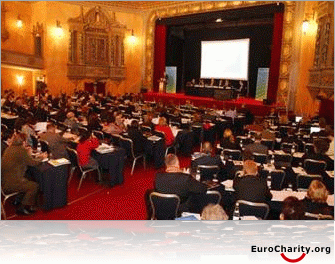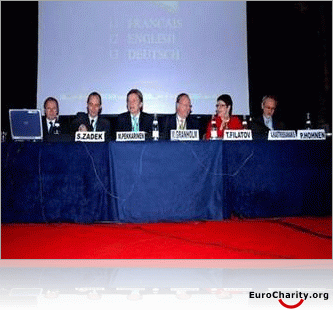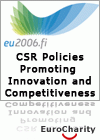EuroCharity’s President, Peter Michel Heilmann, was the sole conference delegate who flew in from Greece. The conference, which was mainly dominated by delegates from Western Europe and Scandinavia, was held at the five-star Hotel Le Plaza Brussels. The conference speakers emphasised that CSR helps businesses and other organisations to plan their activities in the longer term, increasingly a factor of building competitiveness. The essential competitiveness tools include a shared vision within the EU for following, reacting to and predicting global trends.
During Finland’s term of EU Presidency, discussion on CSR has moved to a new level, to the challenges Europe is facing from global competition. In line with its priority area for its Presidency, Finland is eager to link innovations and competitiveness with CSR. During this CSR conference with a new approach, CSR was explored in a concrete way in accordance with the Lisbon Strategy to promote economic growth and employment.
CSR as an authentic part of business operations creates a sustainable basis for innovations, which may be connected with, for example, climate change or other environmental problems, and global social challenges. Through the commercial success of these innovations, the market position of enterprises improves and their competitiveness increases. This also requires awareness of the consumers and markets.
The CSR conference in Brussels will also address the role of the EU internal market and member states, and the significance of employees, social capital and responsible consumers and markets.
The CSR conference in Brussels gathered an extensive group of multinational companies (such as Nestle, Nokia, Microsoft, IBM, Bayer, Metso, PSA Peugeot Ciroen, Seiko Epson, PricewaterhouseCoopers and Arthur D. Little), senior SME executives from Europe (e.g. Kalevala Koru Oy, Finland and The European C”homme”pany, Belgium), representatives of EU member states, members of the European Parliament, the European Commission, interest groups and non-governmental organisations (including AccountAbility, CSR Europe, the Clean Clothes Campaign (CCC), European Trade Union Confederation (ETUC), Confederation of European Business (UNICE), FTA/BSCI (Business Social Compliance Initiative, an initiative of the Foreign Trade Association), International Confederation of Free Trade Unions (ICFTU), Friends of the Earth Europe, Royal Institute of International Affairs (RIIA), also known as Chatham House, and the Finnish Business & Society Association), representatives of business schools (e.g. Solvay Business School, Belgium), universities (e.g. University of Paris-Dauphine) and chambers of commerce (e.g. ICC Finland, the Finnish Section of International Chamber of Commerce) as well as researchers, who shared their views, ideas, experiences and best practice examples in order to put CSR into effect.
The role of Corporate Social Responsibility in “controlling” globalisation
Finland’s Minister of Trade and Industry Mauri Pekkarinen and Finnish Minister of Labour Tarja Filatov discussed ways of activating policy makers, enterprises, investors, researchers and professional and other organisations into CSR by creating, developing, commercialising and selling innovations.
During her keynote speech entitled “CSR as an element of understanding and managing globalisation and sustainable business”, Minister Filatov said: “Unscrupulous competition between companies may make it difficult for corporate management to put ethical and moral principles into practice. Purely voluntary commitment to CSR is often not enough, and for this reason I find it important that public authorities and international organisations develop legislation that supports CSR along with other rules governing responsible action by multinational companies.”
“I believe it is of the utmost importance that members of the ILO [International Labour Organisation] ratify the organisation’s central conventions. Responsible business should be based on a company’s choice to reach the highest level of commitment, having assessed international agreements and local legislation.”
“I find it essential that international policy be used effectively to influence the actions of countries that do not require companies operating on their territory to apply current good business practices and to treat their employees with respect for human dignity.”
“International, labour market and civic organisations are closely monitoring how well companies in different countries follow the rules and guidelines for responsible business operations. For example, the labour market organisations and WorldWatch [Institute] are doing valuable work in this field of action. It is also positive that the media are focusing increasing attention on business practices and appraising their level of responsibility. Nowadays, the openness and speed of communication make it possible for all of us to obtain information on how companies operate, even in countries remote from us.”
Practising CSR can be profitable
Minister Filatov continued by saying: “Information about companies’ malpractices spread faster than information about responsible practices. Signs of ecological and social responsibility or irresponsibility can influence consumers’ purchasing behaviour and consequently companies’ willingness to carry their social responsibility. Many investors, too, follow the ethical aspects of companies’ operations closely.
“Many front-line enterprises incorporate CSR into their business strategies and use it as a means of differentiation and a competitive asset. In this way, adhering to responsible practices helps companies to improve their profitability.”
“Companies have numerous internal and external stakeholders. It is not enough for them to bring in profits for the owners; for the sake of their reputation and competitiveness, they must also take the views of other stakeholders into consideration. The stakeholders expect companies to be productive and profitable and to comply with the minimum legal requirements, but more than ever, they expect a voluntary commitment to social responsibility that exceeds the minimum legislative requirement.”
“Staff want to see responsible practices employed in situations where people are laid off; neighbours want to see malodorous emissions minimised; civic organisations expect more openness and cooperation; charitable organisations want financial support and they want businesses to participate in their projects.”
A responsible company takes responsibility for its people
At the CSR Conference, Minister Filatov also highlighted the fact that good working conditions are a part of competitiveness. “A company is responsible for its people, and a company’s social responsibility is also manifested in good human relations policies. A responsible company follows the principle of non-discrimination in all its operations and ensures gender equality. A responsible attitude is also shown when the company employs disabled people or those with impaired capacity. Multiculturalism should also be promoted in all activities and practices.
“A company can support working time arrangements aimed at meeting employees’ needs, drafted within the terms of collective agreements, in co-operation with shop stewards and staff. In this way the company makes it easier for employees to reconcile the needs of working and family life.
“A good human relations policy that promotes equality, good leadership, co-operating with staff to improve working life and providing good training opportunities should not be seen by a company as a sacrifice or as charity. It is worth investing in these things, as it can reinforce the company’s capacity, its people’s well being, its productivity and also its image. Companies that take their responsibility seriously will be able to recruit new people more easily, and this is a significant competitive asset, especially in industrialised nations with ageing populations.”
CSR is the “hidden key” to EU’s success and innovation
CSR is the “hidden key” to increasing competitiveness and productivity of businesses in order to promote economic growth and employment. Innovative companies have already noticed that the CRS trend is up and started finding ways of incorporating it into their business practices and processes. For companies, implementing CRS means creating a source of innovation and a method of controlling their corporate image. “The experience from the trailblazer companies has been positive, with an increase in company profits,” said Finnish Minister of Trade and Industry Mauri Pekkarinen during the conference.
“When CSR is genuinely incorporated into the company’s business practices, it will create a sound foundation for innovation that can help to solve, among other areas, climate change and other environmental problems or global social challenges. Through reaping the commercial rewards from these innovations, the company’s market position will strengthen and its competitiveness increase. However, this development will require awareness from consumers and other players in the market, such as the EU Member States,policy makers, legislators, authorities and organisations. The Finnish EU Presidency believes it vital for everybody to work in line with sustainable values and principles,” added Minister Pekkarinen.
More information on the conference can be found at http://www.eu2006.fi/.
EuroCharity was the only company from Greece to participate in the proceedings of the CSR conference hosted by the Finnish EU Presidency in Brussels at November 22, 2006
-

Finnish EU Presidency Conference on CSR Policies Promoting Innovation and Competitiveness in Brussels -

Finnish EU Presidency Conference on CSR Policies Promoting Innovation and Competitiveness in Brussels -

Finnish EU Presidency Conference on CSR Policies Promoting Innovation and Competitiveness in Brussels
